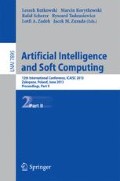Abstract
The advancement of chip-based technology has enabled the measurement of millions of DNA sequence variations across the human genome. Experiments revealed that high-order, but not individual, interactions of single nucleotide polymorphisms (SNPs) are responsible for complex diseases such as cancer. The challenge of genome-wide association studies (GWASs) is to sift through high-dimensional datasets to find out particular combinations of SNPs that are predictive of these diseases. Genetic Programming (GP) has been widely applied in GWASs. It serves two purposes: attribute selection and/or discriminative modeling. One advantage of discriminative modeling over attribute selection lies in interpretability. However, existing discriminative modeling algorithms do not scale up well with the increase in the SNP dimension. Here, we have developed GP-Pi. We have introduced a penalizing term in the fitness function to penalize trees with common SNPs and an initializer which utilizes expert knowledge to seed the population with good attributes. Experimental results on simulated data suggested that GP-Pi outperforms GPAS with statistically significance. GP-Pi was further evaluated on a real GWAS dataset of Rheumatoid Arthritis, obtained from the North American Rheumatoid Arthritis Consortium. Our results, with potential new discoveries, are found to be consistent with literature.
Access this chapter
Tax calculation will be finalised at checkout
Purchases are for personal use only
Preview
Unable to display preview. Download preview PDF.
References
Hirschhorn, J., Daly, M.: Genome-wide association studies for common diseases and complex traits. Nature Reviews Genetics 6(2), 95–108 (2005)
Wang, W., Barratt, B., Clayton, D., Todd, J.: Genome-wide association studies: theoretical and practical concerns. Nature Reviews Genetics 6(2), 109–118 (2005)
Nunkesser, R., Bernholt, T., Schwender, H., Ickstadt, K., Wegener, I.: Detecting high-order interactions of single nucleotide polymorphisms using genetic programming. Bioinformatics 23(24), 3280–3288 (2007)
Moore, J., White, B.: Genome-wide genetic analysis using genetic programming: The critical need for expert knowledge. In: Genetic Programming Theory and Practice IV, pp. 11–28 (2007)
Reich, D., Lander, E.: On the allelic spectrum of human disease. TRENDS in Genetics 17(9), 502–510 (2001)
Moore, J., Asselbergs, F., Williams, S.: Bioinformatics challenges for genome-wide association studies. Bioinformatics 26(4), 445–455 (2010)
Martin, M.C.: Genetic programming for real world robot vision. In: IEEE/RSJ International Conference on Intelligent Robots and Systems, vol. 1, pp. 67–72. IEEE (2002)
Chen, S.H.: Genetic algorithms and genetic programming in computational finance. Springer (2002)
Langdon, W., Barrett, S.: Genetic programming in data mining for drug discovery. In: Evolutionary Computation in Data Mining, pp. 211–235 (2005)
Lo, L., Chan, T., Lee, K., Leung, K.: Challenges rising from learning motif evaluation functions using genetic programming. In: Proceedings of the 12th Annual Conference on Genetic and Evolutionary Computation, pp. 171–178. ACM (2010)
Wong, K., Peng, C., Wong, M., Leung, K.: Generalizing and learning protein-dna binding sequence representations by an evolutionary algorithm. Soft Computing-A Fusion of Foundations, Methodologies and Applications 15(8), 1631–1642 (2011)
Greene, C., White, B., Moore, J.: Sensible initialization using expert knowledge for genome-wide analysis of epistasis using genetic programming. In: IEEE Congress on Evolutionary Computation, CEC 2009, pp. 1289–1296 (2009)
Greene, C., White, B., Moore, J.H.: An expert knowledge-guided mutation operator for genome-wide genetic analysis using genetic programming. In: Rajapakse, J.C., Schmidt, B., Volkert, L.G. (eds.) PRIB 2007. LNCS (LNBI), vol. 4774, pp. 30–40. Springer, Heidelberg (2007)
Estrada-Gil, J., Fernández-López, J., Hernández-Lemus, E., Silva-Zolezzi, I., Hidalgo-Miranda, A., Jiménez-Sánchez, G., Vallejo-Clemente, E.: Gpdti: A genetic programming decision tree induction method to find epistatic effects in common complex diseases. Bioinformatics 23(13), i167–i174 (2007)
Kira, K., Rendell, L.: A practical approach to feature selection. In: Proceedings of the Ninth International Workshop on Machine Learning, pp. 249–256. Morgan Kaufmann Publishers Inc. (1992)
Hahn, L., Ritchie, M., Moore, J.: Multifactor dimensionality reduction software for detecting gene–gene and gene–environment interactions. Bioinformatics 19(3), 376–382 (2003)
Luke, S., Panait, L., Balan, G., Paus, S., Skolicki, Z., Bassett, J., Hubley, R., Chircop, A.: Ecj: A java-based evolutionary computation research system (2007)
Koza, J., James, P.: Rice, genetic programming (videotape): the movie (1992)
Bleuler, S., Brack, M., Thiele, L., Zitzler, E.: Multiobjective genetic programming: Reducing bloat using spea2. In: Proceedings of the 2001 Congress on Evolutionary Computation, vol. 1, pp. 536–543. IEEE (2001)
Wiskott, L., Fellous, J., Kruger, N., Malsburg, C.: Estimating attributes: analysis and extension of relief. In: Bergadano, F., De Raedt, L. (eds.) ECML 1994. LNCS, vol. 784, pp. 171–182. Springer, Heidelberg (1994)
Moore, J.H., White, B.C.: Tuning relieff for genome-wide genetic analysis. In: Marchiori, E., Moore, J.H., Rajapakse, J.C. (eds.) EvoBIO 2007. LNCS, vol. 4447, pp. 166–175. Springer, Heidelberg (2007)
Urbanowicz, R., Kiralis, J., Sinnott-Armstrong, N., Heberling, T., Fisher, J., Moore, J.: Gametes: a fast, direct algorithm for generating pure, strict, epistatic models with random architectures. BioData mining 5(1), 16 (2012)
Gorman, J., David-Vaudey, E., Pai, M., Lum, R., Criswell, L.: Particular hla–drb1 shared epitope genotypes are strongly associated with rheumatoid vasculitis. Arthritis & Rheumatism 50(11), 3476–3484 (2004)
Stahl, E.A., et al.: Genome-wide association study meta-analysis identifies seven new rheumatoid arthritis risk loci. Nat Genet. 42(6), 508–514 (2010)
Png, E., Alisjahbana, B., Sahiratmadja, E., Marzuki, S., Nelwan, R., Balabanova, Y., Nikolayevskyy, V., Drobniewski, F., Nejentsev, S., Adnan, I., et al.: A genome wide association study of pulmonary tuberculosis susceptibility in indonesians. BMC Medical Genetics 13(1), 5 (2012)
Li, S., Wang, L., Berman, M., Kong, Y.Y., Dorf, M.E.: Mapping a dynamic innate immunity protein interaction network regulating type i interferon production. Immunity 35(3), 426–440 (2011)
Author information
Authors and Affiliations
Editor information
Editors and Affiliations
Rights and permissions
Copyright information
© 2013 Springer-Verlag Berlin Heidelberg
About this paper
Cite this paper
Sze-To, HY. et al. (2013). GP-Pi: Using Genetic Programming with Penalization and Initialization on Genome-Wide Association Study. In: Rutkowski, L., Korytkowski, M., Scherer, R., Tadeusiewicz, R., Zadeh, L.A., Zurada, J.M. (eds) Artificial Intelligence and Soft Computing. ICAISC 2013. Lecture Notes in Computer Science(), vol 7895. Springer, Berlin, Heidelberg. https://doi.org/10.1007/978-3-642-38610-7_31
Download citation
DOI: https://doi.org/10.1007/978-3-642-38610-7_31
Publisher Name: Springer, Berlin, Heidelberg
Print ISBN: 978-3-642-38609-1
Online ISBN: 978-3-642-38610-7
eBook Packages: Computer ScienceComputer Science (R0)

